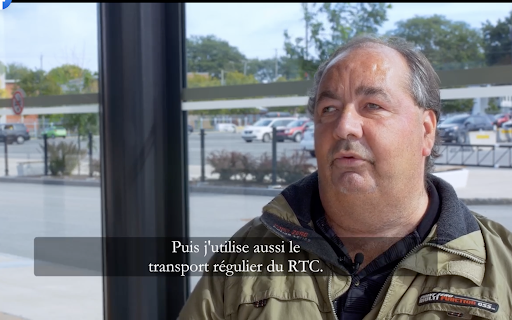Transit for all gaining traction in Quebec City
Ruby Pratka, Local Journalism Initiative reporter
ruby@qctonline.com
Every morning, thousands of Quebec City residents board city buses to go to work, attend school or make it to appointments. Many swipe their OPUS cards without a second thought. However, for people on fixed incomes or without the disposable income to buy a monthly pass ($89.75) or a book of tickets ($58 for 20 rides) in advance, getting the $3.50 needed for a cash fare can become an insurmountable obstacle, forcing them to miss out on job opportunities, medical appointments and time with loved ones.
The Saint-Roch based Collectif pour un transport abordable et accessible à Québec (Collectif TRAAQ) estimates that as many as 54,000 people in Quebec City (one in six adults) struggle to afford bus fare. Since 2016, they have been advocating for people living below the poverty line to have access to half-price bus passes. “If you’re poor, every cent counts,” said Catherine Rainville, social activities coordinator at TRAAQ. “Clothes, food, everything has to be counted. Some people on fixed incomes are left with only $40 a month after food, rent and other expenses; that’s not enough to afford a bus pass.”
On the TRAAQ Facebook page, several people on fixed incomes – single parents, job seekers, seniors and people with disabilities – share stories of having to beg or hunt for cans on the side of the road to get bus fare, or of missing out on important appointments. Ghislain Hudon, a visually impaired transit rider, explains in a TRAAQ video that if bus tickets were more affordable, he would no longer have to choose between bus tickets and food, and would rely less on food aid.
“In 2016, some of us were part of a citizens’ committee where people shared their situations, and we realized that a lot of people lacked access to transit, but no one was talking about it,” said Rainville. “That was when we started looking for solutions.”
One solution they found was social pricing. Several Canadian cities, including Gatineau and Calgary, have already instituted reduced bus fare for people eligible for social housing; Calgary bus passes are priced on a sliding scale, while in Gatineau, riders below a certain income threshold pay two-thirds of the price of a regular pass. “These measures are put in place by the municipality; people sign up for them and then they just go to the store and buy a regular bus pass at a discount, like students and seniors do now,” Rainville explained. The loss of revenue for the transit network, she said, would be made up for by an increase in ridership. In Gatineau, according to La Presse, ridership jumped 32 per cent between 2017 and 2018 after the Société de transport de l’Outaouais brought in a discount for adults making less than $17,000.
Once thought of as radical, the idea is gaining traction in Quebec City as municipal elections approach. Équipe Marie-Josée Savard spokesperson Lara Émond said her party “has opened the door to a social pricing project like the one in Gatineau, accessible to people living in social housing who have shown proof of income. Financial support from the government will be necessary to make these kinds of initiatives permanent.”
Démocratie Québec (DQ) proposes phasing in social pricing, starting with free passes for riders under 18 and half-price passes for seniors, before implementing a discount for low-income adults. “We’re confident that we’ll be able to increase ridership quickly with these measures,” said DQ leader Jean Rousseau, citing the success of social pricing in Gatineau. “They will become so popular that they’ll pay for themselves. We’ll also be able to get young people into the habit of using transit.”
The Québec Forte et Fière party has come out in favour of the TRAAQ proposal; Transition Québec has promised to make transit free for all riders. No one from Québec 21 was available to comment at press time.
“When we first proposed this idea, people looked at us as if we were aliens,” said Rainville. “Now there’s a lot more interest from elected officials about anything that has to do with reducing the cost of living. It’s also an issue of fairness.”

